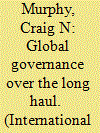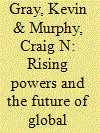| Srl | Item |
| 1 |
ID:
131012


|
|
|
|
|
| Publication |
2014.
|
| Summary/Abstract |
WILKINSON and Weiss (W&W) suggest that questions surrounding global governance-"what makes the world hang together," to follow Ruggie (1998)-should become a central problematique for social scientists and historians studying the relations among the largest human communities in any era and therefore a central matter of interest for International Relations (IR). W&W argue that we should pursue this interest by (i) investigating the different forms of world organization across historical epochs; (ii) identifying and explaining both the largest structures of authority in any epoch as well as their interaction with more local systems; (iii) focusing our attention on power, interests, and on ideas-both those through which actors of a particular epoch come to understand their interests and those that reinforce, perhaps legitimately, the systems of authority of the day; and (iv) searching for ways to account for change both within and between epochs
|
|
|
|
|
|
|
|
|
|
|
|
|
|
|
|
| 2 |
ID:
109864


|
|
|
| 3 |
ID:
121754


|
|
|
|
|
| Publication |
2013.
|
| Summary/Abstract |
There has been much debate over the extent to which the rising powers of the global South are challenging contemporary global political and economic governance. While some observers see an emancipatory potential in the redistribution of power among states, others see the rising powers as firmly located within the Western-centred neoliberal world order. This collection of papers seeks to go beyond the state-centrism of existing approaches by examining how challenges to global governance by rising powers are rooted in specific state-society configurations. Through studies of Brazil, India, China and other important developing countries within their respective regions, such as Turkey and South Africa, the papers examine the way domestic structures, arrangements, actors and dynamics influence the nature of the international interventions and behaviour of rising powers. They ask how their increased political and economic enmeshment in the international system impacts upon their own internal societal cohesion and development. By examining these issues, the papers raise the question of whether the challenge posed by the rising powers to global governance is likely to lead to an increase in democracy and social justice for the majority of the world's peoples.
|
|
|
|
|
|
|
|
|
|
|
|
|
|
|
|